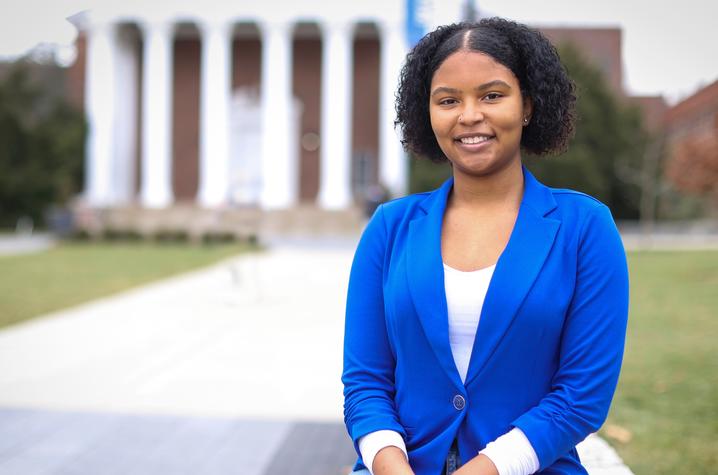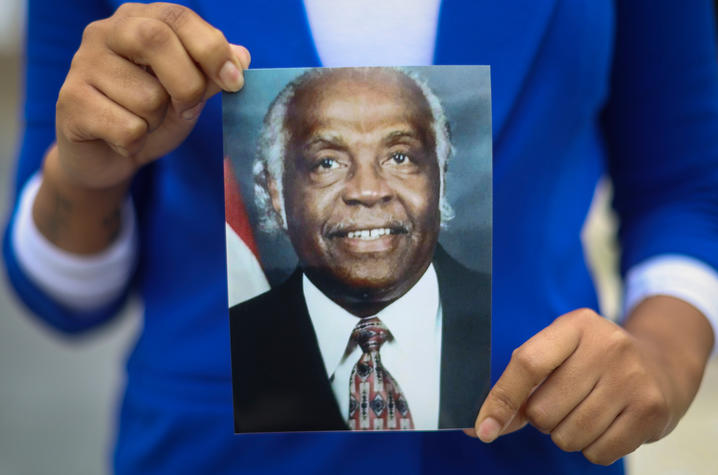UK Health Sciences student reflects on connection to Tuskegee syphilis study
Cori Simpson, a student in the College of Health Sciences at the University of Kentucky, reflects on the commemoration of Black History Month and her connection to the Tuskegee syphilis study.
LEXINGTON, Ky. (Feb. 12, 2024) — As we embark on the celebration of Black History Month, it’s a profound opportunity to reflect on the extraordinary contributions and resilience of the Black community throughout history. This month serves as a dedicated time to honor the trailblazers, activists, artists and leaders who have shaped the world we live in today.
I’m fortunate to have a remarkable individual in my family, Clay Eddie Simpson Jr., Ph.D., my grandfather. Allow me to share our story.
During the 2023 fall semester at the University of Kentucky, I sat in a class taught by Karen Skaff, Ph.D., learning about prominent historical ethical dilemmas that shaped medicine into what it is today.
One of the major events that we discussed was the Tuskegee syphilis study. This was an inhumane study conducted from 1932 to 1972 that was intended to see the natural history of untreated syphilis in Black men.
The doctors implementing the study did not collect informed consent from the participants nor provide them with treatment when it became available. Over 100 of the participants died of syphilis or related complications.
Shocked by the discussion in Professor Skaff’s class, I wondered if my grandfather had any knowledge of this historical atrocity, given that it occurred during his time. After class, I immediately reached out to him, and that's when I discovered his distinguished role in history relating to the study.
On May 16, 1997, former President Bill Clinton addressed an apology to the nation regarding the Tuskegee syphilis study. At the time, my grandfather was the chief advisor to the secretary in the U.S. Department of Health and Human Services on matters of minority health. In this position, he played a crucial part in background research pursuant to the White House event, which assisted President Clinton in drafting the apology that was read to the nation.
“What was done cannot be undone,” said former President Bill Clinton in his 1997 apology. “But we can end the silence. We can stop turning our heads away. We can look at you in the eye and finally say on behalf of the American people, what the United States government did was shameful, and I am sorry.”
This revelation of my grandfather’s involvement left me awestruck, and when I shared it with Professor Skaff, her astonishment mirrored mine. In the subsequent class, she graciously allowed me to speak about my personal connection to the study, a moment of immense pride in my life.
My grandfather, Clay Simpson, graduated from the University of Kentucky with a bachelor’s degree in zoology and a master’s degree in public health. He was among the first Black Americans at the university to do so. He then went on to attain his Ph.D. in preventive medicine and public health from the University of Oklahoma Medical Center.
After making significant contributions to society, Simpson received an Honorary Doctorate of Humane Letters from the New England College of Optometry and William M. Scholl College of Podiatric Medicine. In addition, he received three Honorary Doctorate of Science awards from Meharry Medical College, Tuskegee University and Tougaloo College.
Beyond these accomplishments, he completed a program for health system management at Harvard Business School, solidifying his reputation as an academic standout.
Simpson was sworn into the Federal Senior Executive Service by former President Jimmy Carter and later received the prestigious Presidential Rank Award, the highest honor bestowed upon a federal civil servant.
His illustrious career culminated in his retirement in 1999 from the position of deputy assistant secretary for minority health in the Department of Health and Human Services. He was inducted into the College of Public Health Hall of Fame at the University of Kentucky in 2004, and had a building named after him at Meharry Medical College in Nashville.
Not only was my grandfather impactful in history, but he has also been impactful in my life.
He serves as my confidant in education, career and life in general. He is my ultimate inspiration, contributing to the woman I am today. He bestowed upon me the best father one could ask for.
There are no words or deeds that can adequately express my gratitude, but I’m committed to adding to the foundation and legacy of the "Dr. Simpson" family name that he has diligently created.
With the help of Professor Skaff and the ethical dilemma class I took, I developed a deeper connection with my grandfather, enriching our relationship beyond measure.
As the state’s flagship, land-grant institution, the University of Kentucky exists to advance the Commonwealth. We do that by preparing the next generation of leaders — placing students at the heart of everything we do — and transforming the lives of Kentuckians through education, research and creative work, service and health care. We pride ourselves on being a catalyst for breakthroughs and a force for healing, a place where ingenuity unfolds. It's all made possible by our people — visionaries, disruptors and pioneers — who make up 200 academic programs, a $476.5 million research and development enterprise and a world-class medical center, all on one campus.






